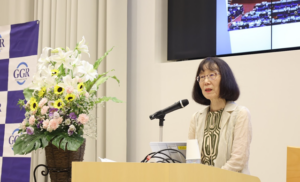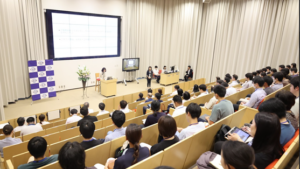On August 26, 2024, the Institute for Global Governance Research (GGR) in collaboration with the Graduate School of Law and the Law School held a seminar that invited Judge Tomoko Akane, president of the International Criminal Court (ICC).
President Akane spoke in detail about her responsibilities and challenges as an ICC judge. She began by expressing her commitment to her role, emphasizing that she takes her work very seriously, particularly because the judgments she renders can have broad and profound impacts on the international community. She then referred to her unique challenges as an ICC judge. In particular, she stated thatthe ICC depends on States’ cooperations so that the cooperation by Japan and the understanding of the Japanese towards the ICC is indispensable. . President Akane stressed the importance of paying attention to the political and social context in which these crimes occurred while upholding the principles of independence.
Judge Akane also referred to historical developments in international criminal law, stating that the ICC is an extension of post–World War II trials such as the Tokyo and Nuremberg trials. She noted that while these early trials laid the foundations for holding individuals criminally responsible for war crimes and crimes against humanity, the trials were often seen as ‘victor’s justice’. In response, the ICC was established as a permanent institution to provide a comprehensive legal framework for a consistent and fair response to these crimes to prevent future offenses.
Judge Akane spoke about the role of ICC judges, noting that they must possess not only a deep understanding of international law but also the ability to navigate complex political and cultural issues. In particular, Judge Akane emphasized the necessity of collaboration with judges from different countries, each bringing distinct legal traditions and perspectives. She said that achieving a balanced and fair interpretation in the final judgment often requires lengthy discussions and negotiations.
Furthermore, she elaborated on the wide-reaching impact of the ICC’s work on the international community. The ICC aims to foster respect for international law and deter future violations by holding individuals accountable for serious crimes. Judge Akane expressed her hope that the ICC’s efforts would contribute to a more just and peaceful world, upholding the rule of law and protecting human rights.
Finally, Judge Akane touched on her experience as a Japanese national serving as a judge at the ICC. She noted that Japan’s acceptance of the Tokyo Tribunal’s rulings after the war was an important step in the country’s reconstruction and reintegration into the international community, and that this experience has influenced her approach in her work at the ICC.
Judge Akane concluded her speech by emphasizing the importance of maintaining the integrity of the ICC and its proceedings. While the Court faces many challenges, including political pressures and resource constraints, she is confident that the ICC will continue to play an important role in promoting international justice.
【Event report prepared by】
Sulastri (Master’s student, School of International and Public Policy, Hitotsubashi University)
Eru Watanabe (Master’s student, School of International and Public Policy, Hitotsubashi University)


